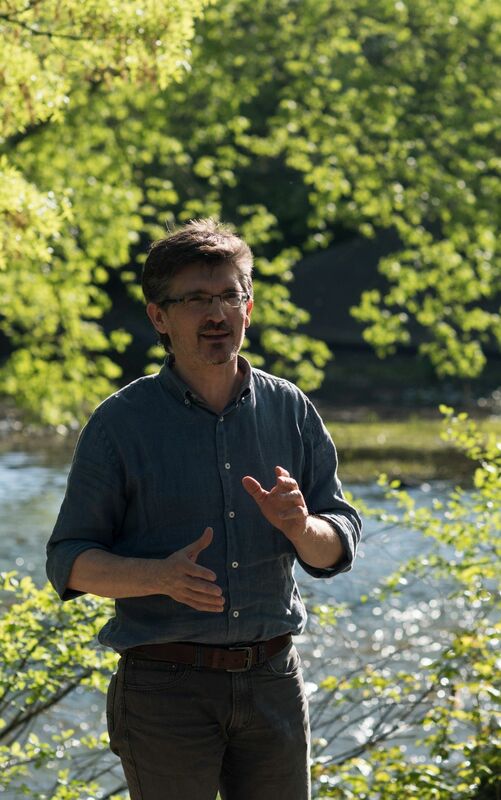Ecohydrology makes hydrology extremely interesting, pushing us to explore how the water cycle affects our environment and forcing us to venture into other disciplines. More profoundly, using the words of the great Jacques Cousteau, ecohydrology reminds us that ‘water and life are one and the same’.
What are your undergraduate and graduate degrees in?
I technically do not have an undergraduate degree, because up until few years ago in the Italian system one would directly go for a 5-year master’s degree (laurea). Thus, after a classical high school, I got my laurea in civil engineering from the Polytechnic of Turin (with specialization in hydraulic engineering) in 1992 and then, after a year of civil service in alternative to the military service, I started a PhD in hydraulic engineering, jointly with the Turin and Milan polytechnics. My PhD thesis (1996) was on nonlinear time series analysis for near wall turbulence and flood forecasting.
How did you arrive at working in/thinking about ecohydrology?
By solving an equation for the steady state probability density function (PDF) of soil moisture, in Jan 1998. I was a researcher (assistant professor), working in a tiny office of the mezzanine of the department of hydraulics at the polytechnic of Turin in collaboration with my great colleague and friend Luca Ridolfi. I was to visit Ignacio Rodriguez-Iturbe for a junior sabbatical at TAMU in the coming months and we had discussed two topics of research: land-atmosphere interaction and stochastic soil moisture dynamics. Ignacio sent us a fax with a stochastic differential equation that he had formulated with David Cox. It soon became clear that the loss function in this equation contained, in a nutshell, lots of ecohydrology. I’ve kept working on this equation (among other things) for more than twenty years now! I’ve always been very interested in water-plant relationships, so adding pieces to this equation and coupling it to other systems has been fun.
What do you see as an important emerging area of ecohydrology?
Ecohydrology gives us knowledge and tools to manage our soil and water resources in a more sustainable way. As I often joke with my students, however, if the ‘ideal politician’ (of an equally ideal society) came and asked the ecohydrologists what the best way is to manage our ecosystems (e.g., type of crops, irrigation and fertilization practices, etc. to avoid land and water degradation, while providing good food in a changing climate), I don’t think we would have a good answer. As silly as this joke may sound, it may be a good way for us to formulate well defined problems, which is crucial to make progress, before (or in parallel to) adding the full complexity of the interacting social system; a bit like we do in hydrology with the potential evapotranspiration concept to provide an upper bound to the actual evapotranspiration.
Do you have a favorite ecohydrology paper? Describe/explain.
I have several of course, but I want to mention here the paper by Guido Salvucci, Estimating the moisture dependence of root zone water loss using conditionally averaged precipitation. Water Resources Research, 37(5), 1357-1365, 2001. This paper used a network of soil moisture measurements in a very clever way to fit the soil moisture PDF and from there obtain the shape of the loss function. The paper is very well done, elegant and insightful. Personally, I also like it because it provided a confirmation that our soil moisture PDF obtained three years earlier made sense when compared with real data.
What do you do for fun (apart from ecohydrology)?
I like mountaineering, gardening, and painting.

 RSS Feed
RSS Feed